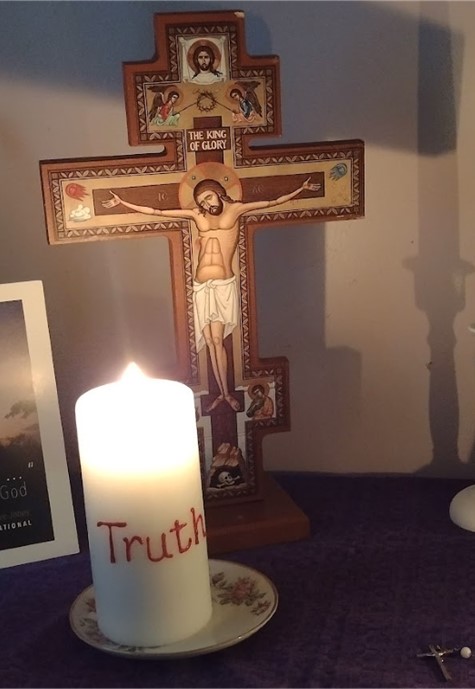Good Friday Reflection: Jesus’ death means more than opening the doors to heaven.
By Robert Fontana

Jesus is not content to have his followers remain in the upper room, in Greek, “Cenacle.” The Cenacle is that warm place of close friendships, Eucharist, foot-washing, and drawing near to the Father’s love in the Son and through the Holy Spirit. The entire purpose of the Cenacle experience is to prepare its participants to leave its safety and security and enter the graced and broken world to be a power for good. It is into the “world” that God so loves that he sent his only Son, not to condemn it, but to save it. John 3:16
The “world” does not mean secular society and culture as opposed to life in the Church with its focus on faith and religious practice. “The world” in Scripture refers to the collective power of sin that shows itself in selfishness, self-centeredness, and violence; the abuse of human rights, break up of families, and the denial of dignity to so many: the unborn, migrants, the elderly, the imprisoned, the disabled, the ill in body and mind.
Jesus leads us out of the Cenacle into the world, a journey that always leads to the cross:
So they took Jesus; and carrying the cross by himself, he went out to what is called The Place of the Skull, which in Hebrew is called Golgotha. There they crucified him, and with him two others, one on either side, with Jesus between them…

A few women from the Cenacle, including Jesus’ mother, and the “Beloved Disciple,” remained with him at the cross. They remained because of love, because they knew that Jesus, who was condemned as a criminal, was just the opposite. But they did not understand, could not understand until after the resurrection, the full meaning of this death: it was a life-giving death, a world-saving death for every human being that had ever lived and would ever live, and for creation itself. For Jesus’ death reconciled the world to God and paved the way to eternal life:
…now Christ has been raised from the dead, the first fruits of those who have fallen asleep. For since death came through a human being, the resurrection of the dead came also through a human being. For just as in Adam all die, so too in Christ shall all be brought to life, but each one in proper order: Christ the first fruits; then, at his coming, those who belong to Christ… (1 Cor 15:20-23)
But Jesus’ death means more than simply opening the doors to heaven. Jesus leads his followers to the cross because in his dying Jesus embraces suffering humanity and invites his followers to do the same. Some of his followers could not bear to be with Jesus in his suffering, and they fled. But others who were more stout-hearted, mostly women including his mother, stood with him in painful solidarity:
Meanwhile, standing near the cross of Jesus were his mother, and his mother’s sister, Mary the wife of Clopas, and Mary Magdalene. When Jesus saw his mother and the disciple whom he loved standing beside her, he said to his mother, “Woman, here is your son.” Then he said to the disciple, “Here is your mother.” And from that hour the disciple took her into his own home…
Good Friday reminds us that we too can stand with the suffering Jesus today, not merely liturgically but personally, by risking to step into the lives of suffering people and assist them in bearing the burden of their suffering. Clearly that is the meaning of Simon of Cyrene who helped Jesus carry his cross. Can we help children, the sick, the mentally ill, the immigrant and refugee, the unemployed and underemployed, the elderly and lonely, know the love of God through sharing our care and compassion?

Fr. Thomas Judge, the founder of the Missionary Cenacle Family to which Lori and I belong, understood this as well. He insisted that the abandoned Christ on the cross, “the naked, crucified Jesus on Calvary,” is the Christ of the Cenacle (Meditations, p. 327); and Christ crucified can only be truly loved and comforted by loving and comforting the poor and spiritually abandoned in the world, those individuals and groups of people who do not know God’s love or the love of their neighbor. The Cenacle that stands at the cross in solidarity with the suffering Jesus is the Cenacle that stands in solidarity with suffering humanity.
On Good Friday we are reminded of the salvific death of Jesus, a death that bore the sins of the world and opened for all of humanity and creation itself, life everlasting. With this truth is a corresponding truth: we disciples of Jesus most effectively remember Jesus’ death by our personal solidarity and service to the suffering people we meet within the providence of our everyday lives.